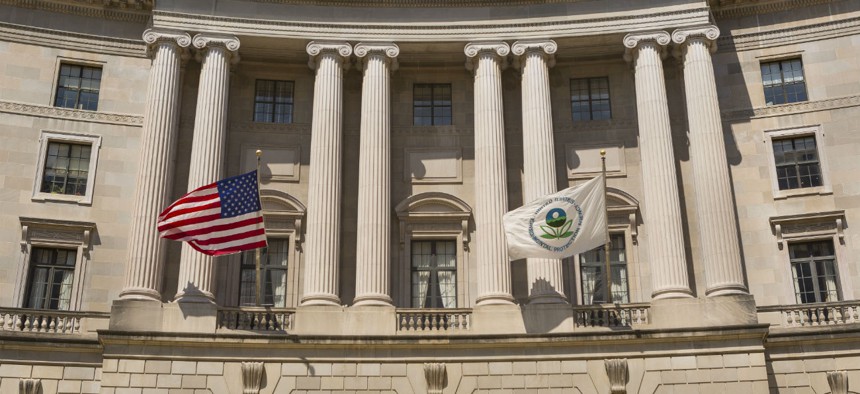
By Rob Crandall / Shutterstock.com
Lawmakers Demand Answers on Alleged EPA Ethics Violations
House overseers say they found multiple instances in which officials flouted required ethics pledges and other disclosures.
The leadership of a House oversight panel on Friday accused the Environmental Protection Agency of flouting federal ethics rules for a number of its top political officials.
In a letter to EPA Administrator Andrew Wheeler, House Oversight Committee Chairwoman Rep. Carolyn Maloney, D-N.Y., and Rep. Harley Rouda, D-Calif., chairman of the committee’s Environment Subcommittee, said that according to documents provided by the agency, a number of senior EPA officials either failed to sign required ethics pledges or were allowed to delay signing pledges or recusal statements.
“The committee identified multiple instances in which EPA officials failed to complete required ethics documents or sign ethics pledges,” Maloney and Rouda wrote. “EPA also allowed officials to delay the finalization of critical ethics agreements for significant periods of time after joining the agency. In one egregious case, EPA allowed William L. Wehrum, the former assistant administrator for the Office of Air and Radiation, to work on official business for more than 300 days before finalizing a recusal statement.”
Prior to joining EPA, Wehrum worked as a lobbyist for the oil, gas and coal industries, but as a result of his delayed recusal, he worked on EPA initiatives like rolling back vehicle fuel economy standards, the committee said.
The committee found that the agency was unable to produce the legally required ethics pledges from at least five political appointees. Another eight officials failed to sign their ethics pledges “in a timely manner.” On average, those officials took 49 days to complete the form after joining EPA. And 26 appointees failed to prepare recusal statements within 20 days. On average, those officials took 151 days to finalize their recusals, the committee said.
In a statement to Government Executive, an EPA spokesperson denied Maloney and Rouda’s allegations, but did not provide information about where the committee erred in its analysis.
“All EPA appointees and advisory board members take their ethics obligations seriously and endeavor to comply with ethics laws and guidelines, and the requirements under the Trump ethics pledge. To say otherwise is just flat out false,” the spokesperson said. “EPA has provided multiple responses to the committee on this topic and the committee has not once raised a single issue with EPA during our ongoing productions of responsive documents.”
But the committee noted that its findings mirrored concerns raised by the Office of Government Ethics during a 2017 investigation, which found that the agency’s Office of General Counsel “may be insufficiently staffed” to provide the necessary oversight and training.
“In the absence of a functioning ethics program, EPA cannot reasonably assure that political appointees are making unbiased decisions when carrying out the governmental responsibilities entrusted to them by the American people,” Maloney and Rouda wrote. “Executive branch ethics programs are intended to establish a foundation on which to build and sustain an ethical culture in the executive branch, including among political appointees who constitute top agency management.”







